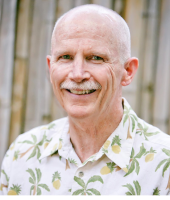Edwin Hutchins
Edwin Hutchins is professor emeritus in the Department of Cognitive Science at the University of California, San Diego. Originally trained as a cognitive anthropologist, his research focuses on cognition as it occurs “in the wild” of naturally occurring culturally organized everyday settings. Over the years he has conducted studies of land litigation the Trobriand Islands of Papua New Guinea, Micronesian navigation, navigation of large ships, and the activity of flight crews on modern commercial airliners. He is considered one of the principal developers of the theory of distributed cognition and of the methods of cognitive ethnography. He is a MacArthur Foundation Fellow and a Fellow of the Cognitive Science Society.
In May 2024, he joins the IAS for a one-month writing residency.
Research Interests
Distributed cognition, cognitive ethnography, artificial intelligence, enaction, embodiment, interaction.
Distributed cognition and cognitive ethnography meet generative artificial intelligence
Mainstream Cognitive science has always worked from the inside out. The computational metaphor for mind posited a central processor implemented via the rule-governed manipulation of strings of symbols. In that approach, cognition was separated from the world by peripheral, non-cognitive, perceptual and motor functions.
In Cognition in the Wild (1995) Hutchins attempted to work from the outside in. He showed how systems larger than an individual may have cognitive properties of their own, and how a careful description of what people actually do can constrain the functional specification of internal cognitive processes.
This project proposes to combine three ideas. One: reject both the inside-out and the outside-in approaches, replacing them with an outside-plus-inside approach that simultaneously examines structures and processes external to a person, processes internal to a person, and the dynamics of interactions among all of these processes and structures. Two: replace the classical model of internal processing that was based on symbol manipulation with a new computational architecture based on generative artificial intelligence. Three: acknowledge that human minds are enculturated, and emphasize the ways that cultural practices shape both internal and external cognitive processes.
Combining these ideas yields a novel perspective on cultural-cognitive ecosystems in which new challenges and new frontiers of research appear.
Key publications
Hutchins, E. (1995) Cognition in the Wild. Cambridge, MA: MIT Press.
Hutchins, E. (2010) Cognitive Ecology. Topics in Cognitive Science. 2 (4), 705 - 715.
Hutchins, E. (2010) Enaction, imagination, and insight. (2010) In J Stewart, O Gappene, and E di Paolo (Eds.) Enaction: Towards a New Paradigm in Cognitive Science, Cambridge MA: MIT Press. Pp. 425-450.
|
New session of the "Paris IAS Ideas" online talk series, with the participation of Ed Hutchins UCSD / Paris IAS Fellow. |
|
|
|
|

